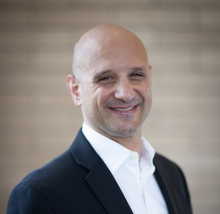Introducing ICRS Director - Aaron Schneider
How do you see your work fitting into a Korbel Institute for Comparative and Regional Studies (ICRS) with a focus on labor, democracy, and the global South?
As I note in the letter from the director on the ICRS website, we face a moment of international crisis and global disorder. The crisis operates at so many levels – economic inequality, democratic decay, climate disaster, international conflict, among others. In such moments, it is especially important to build solidarity with popular sectors and countries from the global South. These are the voices that have been excluded from previous orders, and previous orders collapse at least in part because they have been exclusionary. My own work focuses on the political economy of democracy and development, looking comparatively at Latin America, including a current project comparing booms and busts in development and democracy in Brazil and India. By amplifying and acting in solidarity with voices from popular sectors and the global South, I believe that ICRS can contribute to multilateral, equitable, and peaceful solutions to development challenges.
How does your positionality shape your work as director of ICRS?
When asked about positionality, I reflect on my own trajectory. I grew up in a privileged, upper-middle-class family in Washington, DC and I was relatively thoughtful about international affairs. After college, I lived among demobilized FMLN guerrillas in El Salvador, and I came to realize that being a thoughtful observer was not enough. There are situations that call for radicalism, such as the US-supported, reactionary despotic regime resisted by Salvadoran peasants. My experience led me to recognize that middle-class privilege in the US coincides with injustice for working classes in the North and especially working classes, peasants, and popular sectors in the global South. My work today as director of ICRS, as director of the MA in International Development, and as a faculty member at Korbel is in solidarity with popular sectors in the global South, building bridges to the global North, and undermining the very concept of privilege itself.
What advice would you have to students, activists, and policymakers in terms of building solidarity between North and South?
The main idea that has guided me is humility. I have learned much from colleagues by being humble enough to listen. My research is better, my teaching is better, and my engagement in public life is better when I’m humble enough to listen and learn from others. This is especially the case when it comes to the voices of lower classes and especially lower classes from the global South. They are the most excluded, so we have the most to learn from listening to them. In fact, it seems like Korbel is uniquely positioned to act as a bridge between South and North, as we are located outside the centers of US power. This gives us a degree of room to maneuver and build solidarity. Solidarity is best from a place of humility, building the power of those who have most often been excluded.
